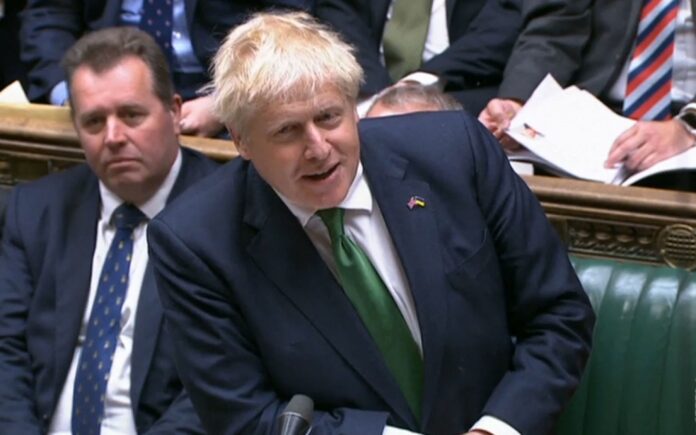Boris Johnson has assured before the British Parliament that “nothing and no one” will be able to stop him as prime minister. The conservative leader has been received with an alternation of cheers and boos on his return to Westminster, two days after overcoming the motion of censure from his own party despite the vote against by 41% of his deputies.
The ‘premier’ has engaged in a harsh exchange with Labor Angela Eagle, who has warned at the outset: “What happened this week has shown how hated this prime minister is, even within his own party. This Administration is too distracted with his internal divisions to be able to face the challenges that we have. If 148 of his own deputies do not trust him, why should the rest of the country?
“I am going to continue with my work and comply with the British”, replied the ‘premier’, who has boasted of having faced “political rivals” in his long career precisely for having achieved “great and notable things that we did not they don’t necessarily support.”
The leader of the Labor opposition, Keir Starmer, has also influenced the division between the ‘tories’ and has said “he is not sure if he heard cheers or boos” at the entrance of the ‘premier’, supported by his cabinet in full. Starmer has recalled the criticism launched at Johnson by his own deputies, alleging “the lack of long-term vision” of his government.
More incisive has been the spokesman for the Scottish nationalists, Ian Blackford, who has compared Johnson to “the black knight of Monty Python, wandering aimlessly and saying it’s just a wound.” “For once in his life, he needs to wake up to reality,” Blackford concluded. “Nothing can free him from the truth: this story will not end until he leaves.”
Johnson plans, however, a counterattack on several fronts that will culminate next week with the law to unilaterally renounce the most controversial points of the Ireland Protocol. Dozens of “rebel” deputies have warned in advance that they could vote against their own government and force a legislative paralysis in the coming months.
The internal opposition to Johnson is made up of very different factions that have converged in what they themselves call “the coalition of chaos”. In the absence of a common leader or a clear strategy, the legislative boycott of the Johnson Government’s initiatives is the first objective, followed by changing the internal rules of the Conservative Party to allow a new motion of censure within a year.
The battle of the Ireland Protocol stands out, however, as the first litmus test after the motion of censure. Weighty figures in the Conservative Party, such as Damian Green, Jesse Norman and Oliver Heald, could lead the internal opposition from the ‘Tory’ seats.
Johnson’s flight forward has also put Brussels and Dublin on guard. Irish Prime Minister Micheál Martin warned on Wednesday that a unilateral withdrawal from the EU deal would be “an all-time low” for London.
Johnson plans, in any case, to return to action this Thursday with the announcement of the expansion of Margaret Thatcher’s initial plan to allow access to the property of families in public housing. The ‘premier’ is receiving pressure from the right wing of the party to announce a tax reduction. Johnson could even take advantage of the circumstances to force a government crisis and introduce significant changes before the summer.
Conforms to The Trust Project criteria








